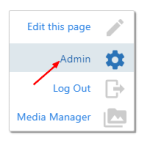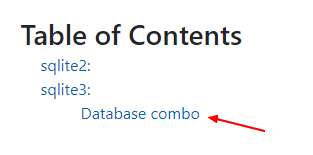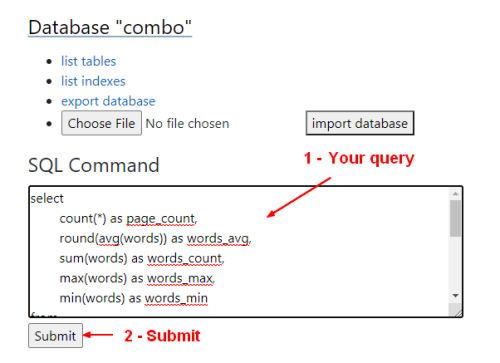ComboStrap - How to query the database
How-to
This page will show you how to query the database online.
Steps
Go to the admin page
Click on the Admin link to go to the Admin Window. ie https://yourdomain.com/?do=admin
With the ComboStrap Template:
With the Dokuwiki Template
Go to the Sqlite Interface
The SQLite interface is a webpage that permits to send statement to the SQLite database.
To access it directly, the URL is https://yourdomain.com/?do=admin&page=sqlite
Choose the database
Choose the Combo database.
If you were users:
- of the 404Manager, the database may be named 404manager
- of the webcomponent plugin, the database may be named webcomponent
The URL to access your database will look like the following URL
https://yourdomain.com/?do=admin&page=sqlite&db=combo&version=sqlite3
Enter your query and submit
Enter the analytical query and submit.
You can try the below query that returns statistics over words.
select
count(*) as page_count,
round(word_count) as word_avg,
sum(word_count) as word_count,
max(word_count) as word_max,
min(word_count) as word_min
from
(
select
id,
word_count
from
pages
)
Advanced: Json Support
If you want to query, the analytics json data, you need to have sqlite with json support.
This steps shows you how to validate that your SQLite database can query JSON.
- The sqlite database version should then be greater or equal to SQLite 3.9.0 (2015-10-14).
select sqlite_version();
^ sqlite_version ^
| 3.28.0 |
- The json module should be present when executing the below SQL.
PRAGMA compile_options;
-- or
select * from pragma_compile_options() where compile_options = 'ENABLE_JSON1';
^ compile_options ^
| ENABLE_JSON1 |
If you have Json enable, you can extract all information in the analytics file.
For instance, the above query can be translated to this query with the json analytics column
select
count(*) as page_count,
round(word_count) as word_avg,
sum(word_count) as word_count,
max(word_count) as word_max,
min(word_count) as word_min
from
(
select
id,
json_extract(analytics , '$.statistics.words') as word_count
from
pages
)
If you don't have the JSON extension or can't install it, you can always download the database file and query it locally for instance with dbeaver




